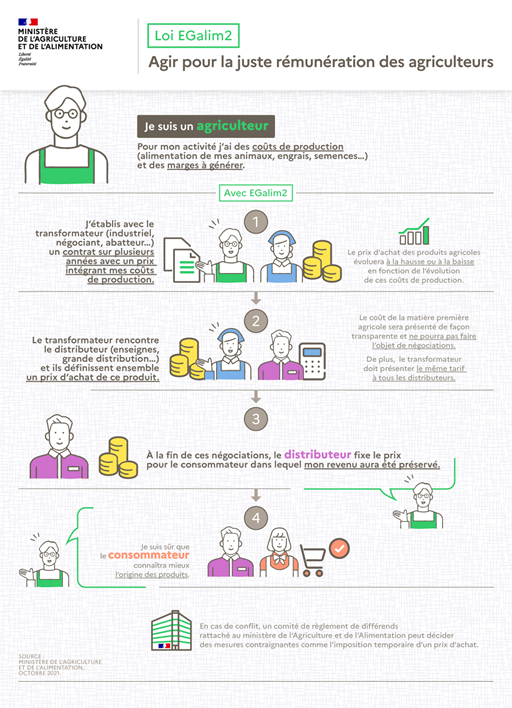Introduction to the challenge addressed
This law will ensure that farmers' production costs are better taken into account, will make it possible to better respect industrial tariffs and will strengthen the indications of origin for meat in restaurants as well as for certain products with a strong agricultural component.
Description of Innovation
This so-called “Egalim 2” law marks a turning point in commercial relations within the food chain, allowing the transition from mistrust to trust between the different links. It will ensure that farmers' production costs are better taken into account, will make it possible to better comply with industrial tariffs and will strengthen the indications of origin for meat in restaurants as well as for certain products with a strong agricultural component.
Ongoing trade negotiations will have a new legislative framework until the first january 2022. This law makes contractualisation obligatory with the upstream. It also introduces an automatic price revision clause and transparency in the general conditions of sale. Compliance with breeders' production costs should make it possible to better value animals and improve the economic situation of farms.
As provided for by the EGALIM 2 Law, the interprofessions and the Livestock Institute indicate reference indicators for contracting in the ruminant, milk and meat sectors. In general, their calculation method is the subject of an interprofessional agreement.The proposed contract or framework agreement constitutes the basis of the negotiation between the parties. In the contract or in the framework agreement, the parties freely define these criteria and these methods for revising or determining the price by including, in addition to the indicator(s) from the basis of the proposal (production cost), one or more several indicators relating to the prices of agricultural and food products observed on the market or markets on which the buyer operates and to the evolution of these prices as well as one or more indicators relating to the quantities, composition, quality, the origin and traceability of products or compliance with specifications."
Impact on farm performance
Compliance with breeders' production costs should make it possible to better value animals and improve the economic situation of farms.

Translation. EGalim 2 law: acting for the fair remuneration of farmers
I am a farmer.
For my activity, I have production costs (feed for my animals, fertilisers, seeds, etc.) and margins to generate.
With EGalim 2
1. I establish a contract with the processor (industrialist, trader, slaughterer, etc.) over several years with a price that includes my production costs.
The purchase price of the agricultural products will increase or decrease according to the evolution of these production costs.
2. The processor meets the distributor (chain stores, supermarkets, etc.) and together they define a purchase price for this product.
The cost of the agricultural raw material will be presented in a transparent manner and may not be subject to negotiation.
In addition, the processor must present the same price to all distributors.
3. At the end of these negotiations, the distributor sets the price for the consumer in which my income will have been preserved.
4. I am sure that the consumer will know the origin of the products better.
[In the event of a dispute, a dispute settlement committee attached to the Ministry of Agriculture and Food can decide on binding measures such as the temporary imposition of a purchase price.]
Further information